- Home
- Gaston Leroux
The Bloody Doll Page 20
The Bloody Doll Read online
Page 20
He had brought a very young wife back from India with him, ‘fair as the day itself,’ worthy of the Fairy Grotto. He was very romantic towards her. They appeared to adore one another.
Many great parties were given in his honour and also in honour of the powerful lords who came to visit him from across the Channel. They did not tolerate melancholy, either. Afterwards, they would all return to Paris, full of regrets.
One day, a few months later, when Georges-Marie-Vincent came back from Paris to Coulteray with the Marchioness, he was still the same – unchanged in his way of life, in good health, and looking upon life gaily: but it was becoming difficult to recognize his wife.
She had lost her fresh complexion; her eyes, that once had reflected the blue of the sky, were shrouded in dark shadows: she, who before had seemed as light-footed as Diana, the goddess of the hunt, as she ran through the woods, now passed listlessly by in the back of a car from which she sadly responded to the friendly greetings of the country folk with a gesture of exhaustion.
In the meantime, one of the women from the village, who took care of the laundry in the chateau, had married a police officer – she, Madame Gérard, found herself doing something for which she received no-one’s thanks.
She was the first person who began to spread the rumour that things were happening at the Chateau of Coulteray that were “quite out of the ordinary!”
She claimed that the Marchioness had told her things in confidence and maintained that, if someone did not intervene, the poor woman would not be around for very much longer – she was greatly to be pitied! The policeman did intervene, but only to silence his chattering other half. He was so successful in doing this, employing methods about which he could not boast, that it was impossible to coax another word on the subject out of Madame Gérard.
But the curiosity of the peasants had been aroused; they waited for the Marchioness to come outside. When she passed them, they sighed:
“Ah, see: that’s what you get if you marry a vampire...!”
From then onwards, things were not the same between them and the Lord of Coulteray... They turned their faces away from him when he passed, they shook their heads, looking at each other with expressions of anxious consternation, smiling sometimes – at the thought of something “that could not be possible in this day and age...”
The Marquis did not persevere with them. He went away again, with his wife.
Two years later, he brought her back at the very end and, today ,they buried her...
Christine and Jacques arrived in the middle of the ceremony.
Five or six hundred people were gathered there, the men bare-headed, most of the women on their knees, as the funeral procession approached. It was led by the clergy and followed by the mayor, the deputies and all the important people from the surrounding countryside. The ‘Daughters of Mary,’ all dressed in white, and the ‘Ladies of the Fire,’ in their curious sylvan costumes, with garlands of forest flowers, surrounded the coffin – which had been left open, according to the ancient custom of the House of Coulteray that sealed the dead in their tombs with the entire local populace present as witnesses. The ‘Ladies of the Fire,’ among whose number could be seen old women with white hair and beautiful young girls, in the bloom of their youth’s spring, was a sisterhood, whose origin was lost in the darkness of the centuries, that followed a druidic rite that celebrated the return of the Summer Solstice with manifestations of joy and the lighting of bonfires in woodland groves. These Ladies danced around pyramids of burning wood, as is the tradition in many other French provinces on Saint Jean’s night, Midsummer’s Eve. In the Coulteray lands, there was not a single village, hamlet or farm that did not light its own bonfire on this night of the year. The local priests were implored to bless them and, when the fire had accomplished its work, they carefully preserved the ashes as a form of protection from storms.
Religion and superstition were joined together in the quaintest manner in this charming land. On this day, when these two were joined even more than was usually the case, they came together to accompany this woman, damned by a cruel fate to share the bed of ‘the Empouse,’ to her final resting place.
Nevertheless, as he walked behind the coffin, borne by four strong young lads from the village, ‘the Empouse’ was a veritable portrait of dejection, his face streaked with tears; the reality of the terrible groans that shook the immense body of the widower, stooped in grief, soon put an end to all thoughts of the cruel legend of which, after all, this poor Georges-Marie-Vincent was, in all probability, the first victim.
They remembered all the attention they saw him bestow upon the Marchioness. Then they saw no more than a husband who wept for his wife – and they wept, in turn: not just for her, but for him as well. Then an incident, something that transpired at the moment the procession entered the small enclosure of the cemetery, roused all the people in his favour.
The (by-now) widow Gérard was there, leaning against a section of the wall, half-hidden in the honeysuckle, but she was not hidden well enough to prevent the Marquis from recognizing her in spite of his despair. He straightened himself, menacing and terrible. His eyes, that up to that moment had been clouded with tears, seemed dried by the fire that lit up in them. His arm stretched out, as if propelled by a spring that had reached its point of maximum tension.
His mouth twitched, but it did not even utter the words “Go away,” which filled it. As if lifted from the earth by horror, the widow had already left. She hurled herself out of the castle grounds and tumbled towards the meadow like a rolling stone.
It was all they could do to prevent themselves from applauding!
They understood his saintly anger... after all, the poor man must have had quite enough of all these stories! He was not ignorant of all the little stupidities that the widow Gérard had been peddling, because he had been obliged to throw her out of his house... and then she had the nerve to show herself at a time like this..!
This transaction ended, to the satisfaction of everyone, and the procession entered the chapel... Christine and Jacques had all the trouble imaginable in getting close to the coffin. Jacques would willingly have given up trying had it not been for Christine who, at an emotional peak, led him by the hand with an irresistible force and said:
“I want to see her... I want to see her!”
It was true, she had not yet seen her – even though the coffin was open. It was in vain that she tried to force her way through the front rows. She had been pushed back and only saw the bed, that had been made for the embalmed corpse from floral wreaths.
The chapel was already full when Christine noticed a man standing in front of the porch, dressed in a black surplice, distributing blows from a flat, black wand whose extremities were decorated with a silver armature, who was driving back the faithful who jostled him in their haste to press forward.
He had to be the sacristan.
“Drouine!” she exclaimed.
He turned around to face her. She still held onto Jacques’ hand. She told him her name, and introduced her cousin.
“My God,” Drouine sighed, raising his eyes to the sky, “you have arrived too late! If only you knew how she waited for you!”
“Can we still see her?” demanded Christine.
“Follow me,” he replied.
He conducted them both down the little underground staircase that led into the crypt. It was still deserted there.
“Take your places in this corner: after the mass, they will bring her down here...you will be able to see her at your leisure. She has never looked more beautiful: one might go as far as to say that she looks like an angel... for the time being they’re going to put her in the tomb of ‘the Empouse’ which, as you certainly will know, is empty. She will not be moved from there until she is finally buried in a magnificent tomb that the Marquis is going to have built for her... close to the tomb of count Francois II, known as ‘Iron Arm,’ who died in the Holy Land. The Marquis is very unhappy, you know!�
�
Then he left them, because he was needed upstairs.
They found themselves in a kind of niche, hollowed out of the wall, which dominated the view over the tomb of ‘the Empouse,’ which lay open, awaiting its new prey...
The stone that had covered it had been slid to one side – revealing an open tomb on which one could still read an inscription that related to Louis-Jean-Marie-Chrysostome, equerry to his majesty.
Jacques felt Christine’s hand in his, trembling. All this pageantry of death, these funeral chants that came to them in their underground retreat like the supplications of the departed rising from the entrails of the earth; these figures made of stone, lying on top of the sepulchres, their hands joined together in a final gesture of supplication and prayer before the Last Judgement; the totality of this scene, illuminated mournfully by the few rays of sunlight that reached them through gothic soupirails that were full of soil and brambles from the cemetery above, would have been more than enough to impress a mind that had been less shaken than Christine’s.
As for Jacques – as usual he cursed his own weakness, which had led to him into this dead end, locked-up with Christine at the very moment when was dreaming of the rebirth of all the vital forces of his bride-to-be amid the radiance of nature triumphant...
He, who was so strong among others and with himself, who was intelligence embodied, did not exist, had never existed, for anyone but her! It made him realize, not for the first time, that it was probably time to give up the struggle. There was a time when he had tried to pull them closer together, and had come to realise that she would always escape him, with her beautiful tranquillity and her sad smile, without a word of protest...
“De profundis clamavi ad te, Domine!” Every spirit, both down here and doubtless on high, has its master. It is unbecoming,even for the proudest, to be malicious... prodigious brains have often been seen to be led by repulsive numbskulls; but Christine was both beautiful and good... “Dies irae, dies illa!”
The wrought iron gate behind the tomb of Francois, ‘Iron Arm,’ opened and the procession of the Daughters of Mary and Ladies of the Fire filed into the crypt, in front of the coffin that the young lads were carrying – raised so high that they might temporarily have been able to enshrine it in the tomb of ‘the Empouse.’
It could have been said that they were arranging a marvellous basket of flowers, on which a sleeping virgin reposed...
Christine’s gaze never left this ideal figure, her eyes opened wide with anguish and sorrow...
Ah, yes! She was beautiful in death, poor Bessie-Anne-Elizabeth! As beautiful as Juliet, entombed, when she descended, with a religious freshness, into the embalmed sanctuary that effaces all torments and lends this terrestrial envelope the purity of the dawn. As beautiful as Ophelia, adorned in her garland of wild petals, her wet hair strung with water flowers... but also like herself, finally free from the outrages of the madman to whom she had offered a pure heart with all its naïve hopes and desires, escaped from a circle of horror that she never understood – to which her reason had succumbed before she exhaled her last sigh...
“Sleep! Sleep your last sleep which, I promise, none shall disturb!” murmured Christine with a sob as she fell to her knees, almost overcome.
A cry of despair answered this moan, and Georges-Marie-Vincent collapsed before the coffin that he, perhaps, had opened.
The ceremony came to an end, the last prayers were said, and the stone was slid over the head of the woman who would never again see the gentle light of day.
They helped the Marquis to his feet, he allowed them to carry him away as if he had suddenly been struck by paralysis. He did not recover the use of his limbs until he went outside into the fresh air. When he saw Christine and Jacques, who were the last two out of the crypt, he took a couple of steps towards the girl and clasped her hands with an effusiveness that turned her to ice...
“Thank you! Oh, thank you for coming – you were always her friend!”
She introduced him to Jacques, her fiancé. He never let go of her hands. Then he insisted that they accompany him back to the chateau.
“Don’t leave me! Don’t leave me on my own! I am so unhappy... if only you knew... if only you knew! But you: you know everything, Christine! There’s nothing I can tell you! You are the only one here capable of understanding the extent of my misery! Ah, I am the most miserable of men!”
And as the crowd dispersed in silence, emptying the courtyard, returning to the surrounding country villages, he held them in the shadows of the castle of death, behind its closed shutters...
“I’m going away,” he said in a broken voice. “I am going far, far away! To where? That I don’t know yet! But I cannot stay here for another moment! Too many memories! Too many memories! Too many sorrows!”
A door was pushed... a door opened... a form that Christine recognized appeared. It was Sahib Khan himself, the Indian physician. He did not utter a single word...
At the sight of him, Georges-Marie-Vincent stood up...
“Farewell!” he sighed with a sound like a death rattle, “farewell, perhaps forever! Ah, how I loved her!” Then he was gone! The noise of the motor car carried him away... he was gone!
They both remained quiet, still struck by this extraordinary despair... that “ah, how I loved her!” would linger in their ears for a long time...
“Maybe the man loved his wife after all!” Jacques exclaimed, after a few moments of terrible silence.
“What are you saying? What are you saying? Ugolin [23] also loved his children!”
“Precisely,” said Jacques, who would not, at this moment, have wanted to upset her for anything in the world. “And now, my little Christine,” he said, rising to his feet, “we must also leave this land... we’ve nothing more to do here... and we must try to forget!”
“Then you can go!” she replied with a sombre expression:
“I’m staying here!”
“You’re staying... here? But why?”
She had approached the window and, through the shutters, was watching something or someone with fierce attention.
“Look!” she said.
He turned his head.
“I’ve spoken of them often enough for you to recognise them!”
“Sangor and Sing-Sing?”
“Yes, it’s Sangor and Sing-Sing! They haven’t gone anywhere... and you expect me to go!” she added in a trembling voice...
“Christine... what do you mean? I don’t understand!” She shrugged her shoulders.
From then on, she acted as if he was no longer there...
She left the drawing room and passed into another room...
He followed her, renouncing all thoughts of interrogating her further... The chateau appeared to be deserted, abandoned.
All the servants were somewhere down in the basement feasting, as is the custom after this kind of ceremony.
They walked quickly through the immense rooms – which bore the marks of the centuries, furnished with objects of inestimable value, sculpted coffers, cast ironwork, high chairs dating from the reign of Francois IV, immense Renaissance fireplaces, marvels that were barely illuminated in the half-light that came slipping through the shutters – until they came to a vestibule. With a haste that Jacques was unable to explain, she began to ascend the staircase of huge marble slabs, which had a balustrade made of wrought iron, coming loose in places, and which had quite probably not been repaired since the time of the other Coulteray, Louis-Jean-Marie-Chrysostome...
When they reached the first floor she headed for a great double-panelled door, as if guided by some instinct of certainty, and opened it.
The odour peculiar to a death chamber reached them at once...
It was the famous chamber of Diane de Poitiers. On top of a podium, the great bed, with its twisted posts, was still strewn with flowers. At each of the four corners of the podium the candles, scarcely snuffed-out, still exhaled their funereal perfume...
She we
nt over to the window, which she opened with a big gesture, and then threw back the shutters. The daylight flooded in. Then she turned and briefly looked at the walls, hung with Flemish tapestries representing themes of combat from the old romances of chivalry.
With a growing sense of stupefaction, Jacques watched Christine carry out a meticulous examination of the figures that recounted the great deeds of the Knights of the Round Table. She passed from one to another, after an examination that was exasperating in its minute attention to detail.
Sometimes she bent down; sometimes she stood on the points of her feet, sometimes she climbed on a stool.
At last, she turned around with a sigh and a puckered face.
She looked at Jacques, apparently without seeing him and, certainly, without hearing him. Even though he was going to risk asking her a question that might vent some light for him on her actions, which seemed incomprehensible, she passed close by him without acknowledging him and, suddenly, as if obeying a new idea, left the room through the passage and entered the adjacent room.

 The Mystery of the Yellow Room
The Mystery of the Yellow Room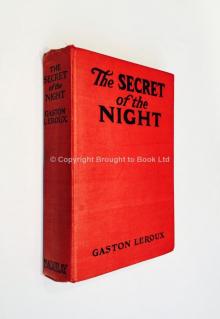 The Secret of the Night
The Secret of the Night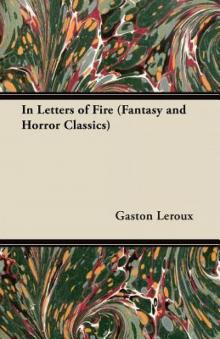 In Letters of Fire
In Letters of Fire The Phantom of the Opera
The Phantom of the Opera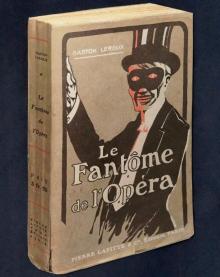 Fantôme de l'Opéra. English
Fantôme de l'Opéra. English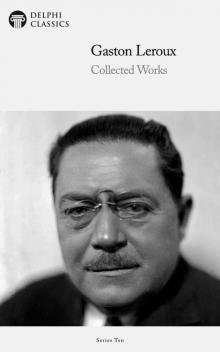 Collected Works of Gaston Leroux
Collected Works of Gaston Leroux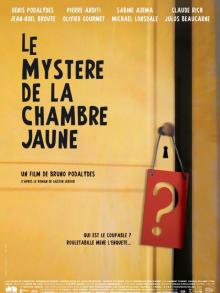 Le mystère de la chambre jaune. English
Le mystère de la chambre jaune. English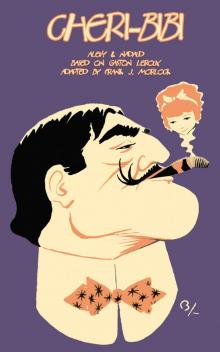 Cheri-Bibi: The Stage Play
Cheri-Bibi: The Stage Play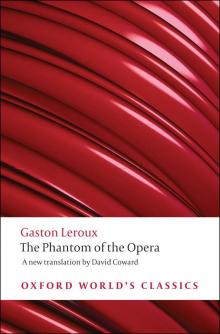 The Phantom of the Opera (Oxford World's Classics)
The Phantom of the Opera (Oxford World's Classics)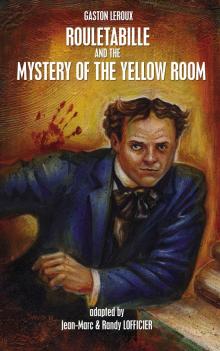 Rouletabille and the Mystery of the Yellow Room
Rouletabille and the Mystery of the Yellow Room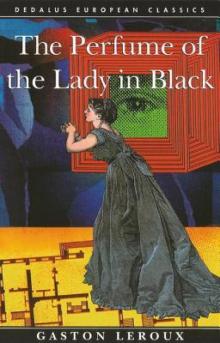 The Perfume of the Lady in Black
The Perfume of the Lady in Black The Bloody Doll
The Bloody Doll Rouletabille at Krupp's
Rouletabille at Krupp's Phantom of the Opera (Barnes & Noble Classics Series)
Phantom of the Opera (Barnes & Noble Classics Series)